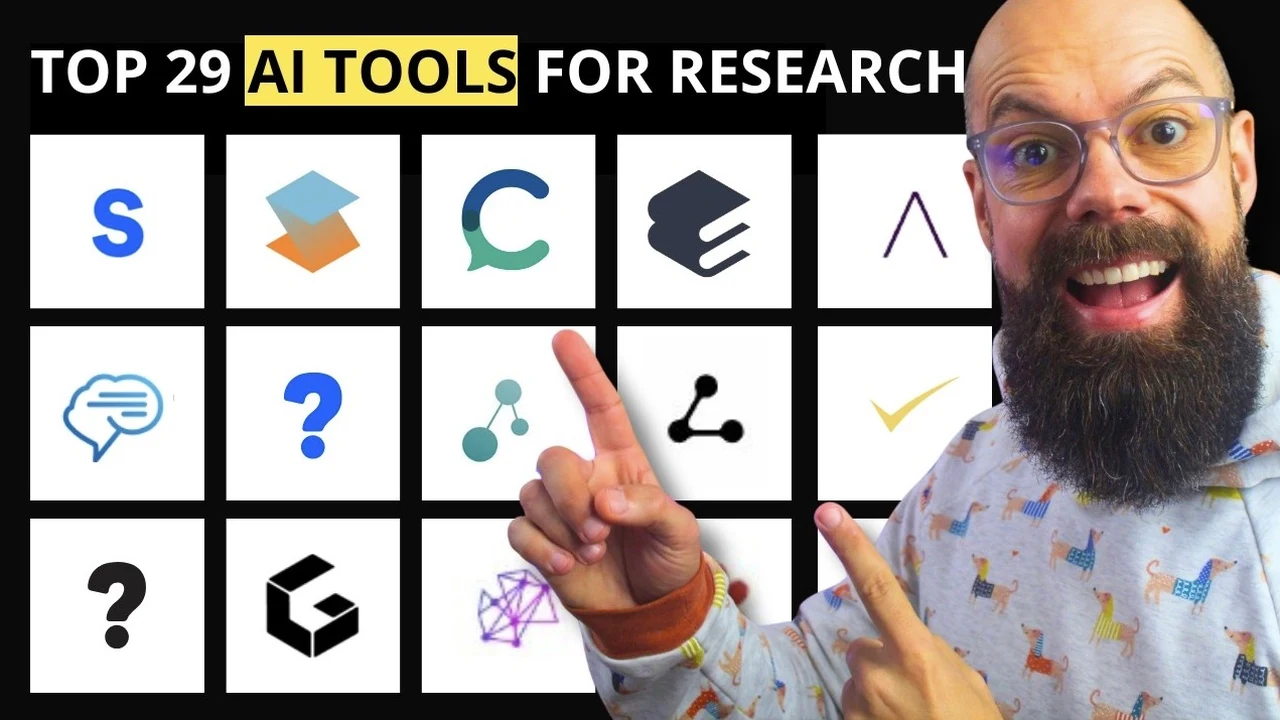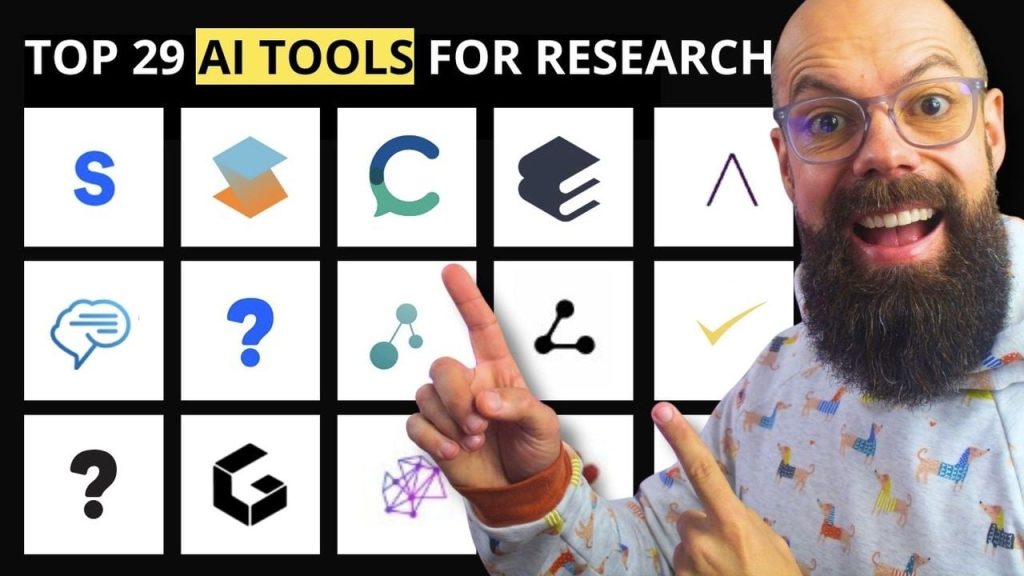
What if you could cut your research time in half while uncovering insights you might have otherwise missed? In the ever-evolving world of academia, where deadlines loom and the pressure to publish is relentless, the integration of artificial intelligence (AI) into research workflows is nothing short of innovative. Imagine tools that not only help you locate the most relevant studies but also map out citation networks, refine your writing, and even draft sections of your paper, all in a fraction of the time it would traditionally take. These AI-powered solutions are not just conveniences; they’re fantastic options, redefining how researchers approach everything from literature reviews to data visualization.
In this overview, Andy Stapleton explores some of the top AI tools for research that are designed to streamline your academic workflow and elevate the quality of your work. Whether you’re looking to automate repetitive tasks, uncover hidden connections in your field, or polish your writing to meet professional standards, these tools offer a range of functionalities tailored to the unique challenges of research. From platforms that centralize your workflow to specialized tools for niche needs, this guide will introduce you to technologies that can help you work smarter, not harder. The possibilities are vast, and the potential to transform your research process is closer than you think.
AI Tools for Researchers
TL;DR Key Takeaways :
AI tools like Scite AI, Semantic Scholar, Anara AI, and Scinito provide all-in-one research platforms, streamlining workflows by integrating project management, literature search, and collaboration features.
Specialized tools such as Elicit, Litmaps, Connected Papers, and Research Rabbit enhance literature reviews and citation mapping, offering interactive visualizations and personalized recommendations.
AI-powered writing tools like Trinka, Paperpal, Thesify, and Writefull AI improve academic writing by refining grammar, tone, and formatting while ensuring plagiarism-free and submission-ready manuscripts.
Data analysis and visualization tools, including Julius AI and Explain Paper, simplify complex data interpretation and create impactful visual representations of research findings.
Advanced citation and source management tools like Sourcely and Petal AI automate referencing tasks, ensuring accuracy and saving time for researchers.
All-in-One Research Platforms
AI-powered platforms like Scite AI, Semantic Scholar, Anara AI, and Scinito offer comprehensive solutions for managing multiple aspects of research. These tools are designed to centralize your workflow, allowing you to perform various tasks seamlessly in one place.
– Scite AI verifies research claims by analyzing how papers are cited and whether the citations support or contradict the findings.
– Semantic Scholar provides free access to a vast database of academic papers across disciplines, helping you quickly locate relevant studies and resources.
– Anara AI and Scinito further enhance productivity by offering features such as automated presentation creation and collaborative tools for team-based research.
By consolidating these functionalities, these platforms simplify your workflow, helping you stay organized and focused on your research objectives.
Tools for Literature Reviews and Citation Mapping
Conducting a thorough literature review is a critical yet time-intensive part of research. AI tools like Elicit, Litmaps, Connected Papers, and Research Rabbit are designed to make this process more efficient and insightful.
– Elicit uses AI to identify relevant studies and summarize key findings, streamlining the process of conducting systematic reviews.
– Litmaps and Connected Papers provide interactive citation maps, allowing you to visualize relationships between studies and track the evolution of research within your field.
– Research Rabbit offers advanced search capabilities and personalized recommendations, ensuring you don’t miss critical papers.
These tools not only save time but also provide a deeper understanding of the research landscape, allowing you to identify gaps and opportunities in your area of study.
Powerful AI Tools for Research in 2025
Gain further expertise in AI tools for research by checking out these recommendations.
Enhancing Academic Writing
Clear and precise academic writing is essential for effectively communicating your research. AI tools like Paperpal, Thesify, Trinka, and Writefull AI are designed to help you refine your writing and ensure it meets professional standards.
– Trinka focuses on improving grammar, consistency, and academic tone, ensuring your work adheres to scholarly conventions.
– Paperpal checks for plagiarism, formatting errors, and journal-specific requirements, making your manuscript submission-ready.
– Thesify enhances your vocabulary by suggesting contextually appropriate synonyms, while Writefull AI ensures clarity and coherence.
These tools provide actionable feedback, helping you produce polished, high-quality academic writing that resonates with your audience.
AI Writing Assistants for Drafting
Drafting academic documents can be a time-consuming process, but AI writing assistants like Jenni AI, Yomu AI, and Thesis AI simplify this task by automating repetitive elements and generating well-structured drafts.
– Thesis AI specializes in creating comprehensive literature reviews, complete with accurate citations, saving you hours of manual effort.
– Jenni AI and Yomu AI assist with drafting research papers, essays, and proposals, allowing you to focus on refining your arguments and conducting critical analysis.
By automating the initial stages of writing, these tools free up your time for deeper intellectual engagement with your research.
Data Analysis and Visualization Tools
Interpreting and presenting research data is a crucial aspect of academic work. AI tools like Julius AI and Explain Paper make data analysis and visualization more efficient and accessible.
– Julius AI extracts insights from raw data, helping you identify patterns, trends, and correlations that might otherwise go unnoticed.
– Explain Paper simplifies complex research findings, making them easier to understand and communicate to a broader audience.
These tools are invaluable for creating clear, compelling visualizations that enhance the impact of your research findings.
Streamlined Citation and Source Management
Managing references and verifying sources can be a tedious and time-consuming task. Tools like Sourcely and Petal AI are designed to simplify these processes, ensuring accuracy and reliability in your research.
– Sourcely identifies supporting or opposing evidence for your claims, helping you construct well-founded arguments.
– Petal AI allows you to interact with multiple documents simultaneously, generating AI-driven summaries, tables, and citation lists.
By automating citation and source management, these tools save you time and reduce the risk of errors, allowing you to focus on the substance of your research.
Specialized Tools for Niche Needs
For researchers with specific requirements, specialized AI tools like Consensus AI, Seamless for Science, and Gatsbi AI offer tailored solutions to address unique challenges.
– Consensus AI answers research questions with clear yes/no responses based on existing studies, making it ideal for hypothesis testing.
– Gatsbi AI supports patent writing and research paper drafting, catering to researchers in technical and legal fields.
– Seamless for Science assists with grant searches, essay writing, and administrative tasks, streamlining the funding application process.
These tools are particularly valuable for researchers working in specialized or interdisciplinary fields, where conventional tools may fall short.
Additional Tools for Simplified Research
Beyond the core tools mentioned above, other AI solutions like Scholarcy, Logically AI, and Paper Guide further enhance your research experience.
– Scholarcy analyzes and summarizes uploaded research papers, providing quick insights into their content.
– Logically AI aids in source verification and fact-checking to maintain research integrity.
– Paper Guide combines AI-powered search, literature review, and reference management into a single platform, offering an all-in-one solution for researchers.
These tools ensure a seamless research process, allowing you to focus on advancing your work and making meaningful contributions to your field.
Media Credit: Andy Stapleton
Filed Under: AI, Guides
Latest Geeky Gadgets Deals
Disclosure: Some of our articles include affiliate links. If you buy something through one of these links, Geeky Gadgets may earn an affiliate commission. Learn about our Disclosure Policy.

